#trapper meta
Explore tagged Tumblr posts
Text
let's talk about trapper's flaws then:
in s02e03 radar's report he contemplates how easy it would be to kill a patient who he perceives has caused the death of another patient. this is commentary on how state propaganda affects civilians because in the opening scene, trapper states "they're all brainwashed to see any american as the enemy", in reference to the same patient, a chinese soldier - his single most plot-relevant lapse imo.
he's stepping out on his wife and she's probably not cool with it but it's hard to link to an obvious overarching flaw because he's shown to be otherwise honest, loyal and selfless, just not towards louise. the flaw here for me is marrying her in the first place instead of living by his values, so maybe even connected to the previous bullet point - dishonesty to oneself as a result of outward influence
misogyny. no two ways about it, but kind of boring because it's not unique to him.
he shares a personality with hawkeye - but this is a concern that the audience might have, not a concern other characters might have. unless you're frank burns i guess, in which case, the flaw is being a bleeding heart liberal (which would make for an interesting fic imo)
he's not quite passive, but he's less active than Hawkeye, so maybe he could fall into apathy without a spark to set him off - but again, this is me trying to find a watsonian explanation for the Trapper character being the follower half of the HawkTrap duo
there's a handful of other instances where he does some unsavory stuff, but they're almost always one-offs that are contradicted by other consistent behaviours:
stealing hawkeye's watch in s03e22 - I mean, he steals hawkeye's watch to bet in a poker game, but it's a good thing he does because hawkeye uses the winnings to get the army off his back. also like, hawkeye bet Trapper's face for a chance to fuck Margie so shrug
i feel obliged to mention the note thing but again, it's a one-off, and what's the flaw here? avoidant? nope, he waited around as long as could. not anticipating a need that even the audience couldn't have anticipated at this point because there's never a mention of it up until s04e01? but he's steadfastly stood by hawkeye at every turn up until this point, it's hard to imagine what could have led the writers to write such an exit except for the fact that wayne rogers unexpectedly left the show. in this way, trapper's exit is not unlike henry's death: bad luck, bad timing
he's dismissive of hawkeye at first in pierce/hyde instead of, idk, playing along with the delusion or whatever the good option was here. the epilogue kind of negates this though because it implies he knew what was "wrong" with hawkeye the whole time... but i suppose we can pretend it only occurred to him when he saw hawkeye drive off hauling the general in the latrine
#okay. so there are less flaws than i thought lol.#i mean the most consistent flaw i've gleaned from being in this fandom is that he's not BJ which. to each their own.#if anyone can think of others i'm curious#trapper meta#re: mash
30 notes
·
View notes
Text
Trapper's dialogue in Kim speaks to how he tried to handle the war - by trying to find some good or some meaning in it. If his plan was to compartmentalize his experience in Korea in order to move on with his life, why would he take home a constant reminder?
One might say all his tomfoolery w/ Hawkeye is also an example of Trapper trying to make the best of a bad situation. I think that's a fair read. But Kim would've been a postwar commitment, so that gives us a look into postwar Trapper.
Though not devoid of good intent, I think it was misguided attempt by him to reconcile how he feels about wasting his life in the war.
I don't think Trapper is good at compartmentalizing his emotions I think he just wants people to think that
30 notes
·
View notes
Text
Why Do Old-School TV Duos Have SUCH MLM Vibes?!
I think there’s something very specific about the formula and writing style of non-serialized/semi-serialized shows from the 60s to 80s that featured two grown men going on wacky dangerous adventures that makes my gay little literary analysis brain go absolutely off the wall bonkers. I’m trying to figure out why!
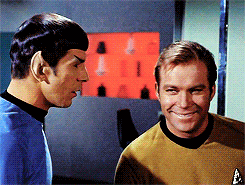
I’m writing this on my Trek blog because I don’t think this pattern in people actually shipping these types of relationships the way they do if fandom as we know it wasn’t born via TOS in syndication. That being said! I also think it has to do with the way these shows are designed that makes myself and others OBSESSED with a specific character dynamic that feels (to me) damn near impossible to replicate in modern television. In a way that’s more than just fandom, it’s in the way TV like this was written at the time!
Further explanation under the cut!
🏳️🌈🏳️🌈🏳️🌈🏳️🌈🏳️🌈🏳️🌈🏳️🌈🏳️🌈🏳️🌈🏳️🌈🏳️🌈🏳️🌈🏳️🌈
I think what it usually boils down to is this. There’s a charming protagonist whom without the series could not operate, frequently top billed or the title character! (See: Wild Wild West, Starsky & Hutch) BUT he doesn’t have anyone to play off of! So what do they do pretty much every single time? Give Mr. Idealized Vision of Time-Period Masculinity For Genre a second guy to rhyme with!
See but the other guy has to play opposite but parallel to our hypermasculine protagonist. So what frequently ends up happening is that in order to play off our “normal” guy, even though he’s also a white dude, is that he’s still somehow Other.
They’re always perfect for each other, and they always get into scenarios that would be written, shot and interpreted by conventional audiences as romantic IF either one of those characters were a woman! Especially at the time these shows were made in.
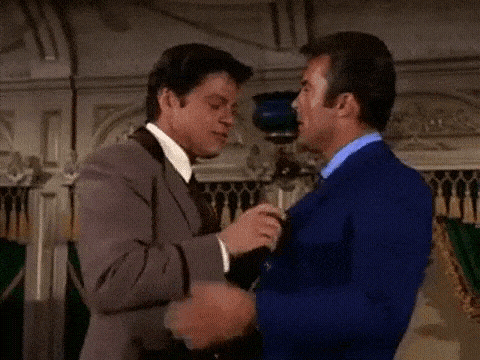
If the one is aggressive, the other is gentle. If the protagonist is violent, his counterpart is intellectual. If the one is stoic, the other is emotional. Which (while one size def doesn’t fit all) usually makes the second guy come off as much more queer-coded (and sometimes other minorities like neurodivergent/disabled etc) than the other because of the traits associated with masculinity vs gayness at the time! Our prime examples in these gifs are Spock, Hutch, Artemus, and also *BJ!
*(M*A*S*H is a bit of a unique case since the show flirts with queerness more openly in ways that people more into the series have explained better than me but I think it still fits the formula I’m discussing.)
Here’s the thing though right? We’ve got two best friends, and the show NEVER really feels right if one of them is missing unless the focus of the story is how A & B operate without each other while trying to find the other one. They stick with and rescue each other unfailingly in scenarios that might destroy a regular friendship.
Hell, there’s often stuff that would emotionally/physically destroy a regular person/character in modern media. But because it’s not serialized they always seem to pull through seemingly through the power of friendship alone or dealing with it off-screen! Emotional consequences? Yuck! (Unless it’s M*A*S*H or Starsky & Hutch, like I said, not monolithic)

Here’s the thing that some people might say throws a wrench into the interpretation I’m discussing. What about the absolutely non-stop parade of conventionally attractive women the main protagonist (and less frequently the supporting man) goes through?
I would reply: how many of those female characters actually emotionally impact our protagonists as characters long term?
The answer is of course, because it’s NOT serialized, almost none! Kirk can watch Edith Keeler get killed by a car accident and still be making eyes at Spock the next episode. Hawkeye can have a “life changing” romance with a Vietnamese humanitarian woman, then share a blanket with BJ next episode like she never existed!
The Doylist explanation of course is not just the fact it wasn’t serialized but also just, constant, blatant 20th century sexism. Which SUCKS!!! As well as not wanting a long term love interest to throw off the character dynamic of our duderagonists. It’s the 20th century tv equivalent of bros before hoes.
However the Watsonian explanation always seems to result in no love interest EVER being more important than what the two protagonists have no matter whether you think they’re queer or not. No attractive woman could make our reputed babe-hound protagonist abandon his buddy. There’s no earnest romance our more queer-coded supporting man doesn’t end (or get ended for him) often for the protagonist’s sake.
Now some of these women are incredibly well written and straight up GOOD matches for our guys. So why wouldn’t they get involved in something long term UNLESS!! They were in love with each other the WHOLE time?
What if protagonist (frequently the babe hound) doesnt know he’s queer, or knows but doesn’t know he’s in love with his bestie, or any number of similar fruity explanations? The supporting man also runs into this explanation but people tend to believe he’s already aware that he’s queer but either also doesn’t know he’s in love or is keeping it to himself because time-period homophobia and/or thinking (probably not unreasonably) that babe hound is straight?
Between the inherent closeness of being narrative foils. The regularly scheduled life or death drama creating sometimes insanely romantic (in the narrative if not a literal sense) drama between the two. The revolving door of weekly women they never seem to get attached to enough to leave one another. The non-serialized nature resulting in sparse personal information/history about the protagonists as a result.
I think between the very NATURE of the way tv shows were written at the time. Plus the way fandom was shaped by a dynamic that has rippled through how media works and is interpreted by fans for decades upon decades. It’s not hard to imagine getting really emotionally invested in the possibility of the protagonists being in love is a fantastic way to enjoy the media!
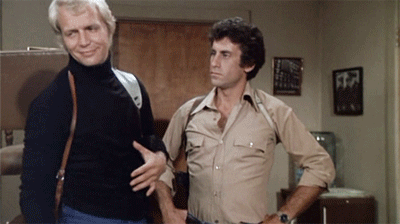
In conclusion, it’s really fun and easy to go “these bitches gay! Good for them good for them!”
#Star Trek#star trek the original series#Star Trek tos#tos#james kirk#Spock#spirk#k/s#James west#Artemus Gordon#wild wild west#Jim west/artemus Gordon#m*a*s*h#hawkeye pierce#bj hunnicutt#Hawkeye/bj#Hawkeye/trapper#starsky and hutch#starsky/hutch#ken hutchinson#dave starsky#vintage television#queer#lgbt#gay#meta#meta analysis#queer analysis#queer representation#mlm
195 notes
·
View notes
Text
Hawkeye and Frank are the two most diametrically opposed characters on Mash. They clash politically, ideologically, emotionally, intellectually, and even physically on more than one occasion. There is virtually nothing they agree on. But they do have one significant similarity: both Hawkeye and Frank are notably, pointedly effeminate.
Hawkeye is the central protagonist, so he's written to be likeable, even admirable, especially in the first five seasons of the show when satire dominated rather than character drama. He's the character who makes the correct political points and voices the show's ideology, and male audience members are encouraged to identify with him and aspire to be like him. He's witty, he's smart, he's charismatic, he dodges consequences a lot, he's highly skilled in his work, and he has a strong personality and natural leadership qualities.
Frank is the main antagonist up until the end of season five. He's written for audiences to hate him, mock him, and occasionally be horrified by him. He's dull-witted, incompetent, awkward, easily led and manipulated, and always gets his comeuppance. Few audience members are likely to aspire to be more like Frank Burns.
And yet, while most likeable protagonist/detestable antagonist duos in American popular media would also be differentiated in terms of gender performance as a matter of course - the effeminate villain being a standard stock character, always set against a ruggedly masculine hero - Mash takes a different approach.
From his core personality as a sniveling, weak-willed follower, to the way other characters, including Hawkeye, routinely make fun of him by comparing him to a woman or insinuating that he's gay, Frank Burns certainly fits the part of weak, emasculated villain. What's more interesting, and much less commonly seen in Hollywood media, is that Hawkeye is portrayed as just as unmanly, and just as, if not more prone to having it pointed out in the show.
Often Hawkeye's jokes at Frank's expense include the implication that Hawkeye is attracted to him himself, and not necessarily as "the man." He jokes, "Guess it's a marriage, Frank. I know I can do better, but at my age, can I wait?" in Hawkeye, Get Your Gun; he switches from calling Frank one of his vampire brides to taking the feminine part in post-coital pillow talk after siphoning his blood in Germ Warfare; he kisses or tells Frank to kiss him in Major Fred C. Dobbs, For the Good of the Outfit, and Bulletin Board, etc.
Other times, the jokes Hawkeye makes about himself are virtually identical to the jokes made at Frank's expense - their respective attractions to Margaret as a potentially dominant sexual partner, eg, with both Frank and Hawkeye portrayed as eagerly submissive. For instance, in 5 O'Clock Charlie Hawkeye jokes about tying Frank to Margaret's tent, then dismisses the thought with, "He'd probably love it. I know I would." And Hawkeye/Trapper and Frank/Margaret are sometimes paralleled as dual couples, Hawkeye and Frank usually being framed as the more feminine partner in each.
And of course, unconnected to Frank, there are many, many more examples of Hawkeye's effeminacy, both in jokes and in personality traits.
Hawkeye is a self-professed coward who is loud and proud about how terrified he is to be stuck in a war zone. He's emotionally open and highly empathetic, always willing to listen to others' problems and discuss (or scream about) his own. He abhors institutional violence and faces every enemy combatant with his hands firmly in the air. When authority is thrust upon him he strives to relinquish it, and uses it as little as possible.
More shallowly, he has little interest in sports and exercise, derides masculine hobby magazines like Field and Stream and Popular Mechanics, is incapable of performing mechanical tasks to the exasperation of others at least four times (Comrades in Arms which explicitly frames this emasculating, In Love and War, Patent 4077, and Hey, Look Me Over), mocks traditional masculinity in many ways, and enjoys musical theatre and Hollywood gossip. And he makes and takes literally hundreds of jokes about being unmanly and having sex with men himself, many more than he makes at Frank's expense.
But while the jokes are at Frank's expense and meant to belittle him, they're rarely made at Hawkeye's expense, especially in the first five seasons. Hawkeye doesn't make the jokes out of self-deprecation, he makes them out of pride and a desire to differentiate himself from the army men he's surrounded by. He's almost always in on the jokes others make about him, rather than offended - Potter telling him to file a paternity suit against his rival in Hepatitis makes him laugh delightedly, and Trapper's remarks on his effeminacy, such as Miz Hawkeye in Hot Lips and Empty Arms, are sometimes lightly teasing but always a regular aspect of their dynamic that Hawkeye enjoys playing up. Frank doesn't make any jokes directly mocking Hawkeye's masculinity that I can recall, beyond vague "pervert" and "degenerate" remarks, which, while often historically homophobic, in the show's context tend to be treated as a reference to his heterosexual endeavours.
Frank's effeminacy is a point of mockery and derision, but Hawkeye's is a point of pride, and not intended to make him any less likeable to an audience. Antagonists don't get to score points off of Hawkeye by mocking his feminine traits, but Hawkeye makes fun of Frank regularly by mocking his feminine traits.
This difference in framing can partially be explained by the nature of their respective gender performances.
While Hawkeye and Frank are both effeminate, they're effeminate in many opposite ways. Frank is weak-willed while Hawkeye is strong-willed. Frank is unappealing to most women, while Hawkeye is something of a lady's man. Frank cannot face his fears to rise to a challenge, but Hawkeye can. But on the flipside, Frank refuses to admit to fear while Hawkeye openly proclaims it. Frank strives to attain authority while Hawkeye refuses it or takes it on only begrudgingly. Frank is obsessed with guns to a freudian extent while one of Hawkeye's most famous monologues of the show is a speech about refusing to carry one. Frank worships the concept of traditional masculinity even while he can't perform it himself, while Hawkeye mocks the concept and would refuse to perform it even if he could.
The Sniper is an excellent case study of these contrasts. In this episode, Hawkeye is effeminate and at ease with it, while Frank is desperate to prove himself masculine. Frank and Margaret flirt with strong Freudian overtones while Frank shoots a gun while nearby Hawkeye flirts with with a nurse with a line about "tasting" her. Hawkeye connects with the nurse he's wooing by relating to how scared she is and huddling in fear with her, while Margaret demands that Frank prove his masculinity by going out and taking down the sniper himself. Frank carries a gun while trying to approach the sniper, while Hawkeye carries a white flag. Frank tries to make fun of Hawkeye for wanting to surrender, but he can't bring himself to approach the sniper while Hawkeye does.
This contrast of gender performance is a consistent aspect of Hawkeye and Frank's dynamic throughout the show, but The Sniper makes it a central theme so it's a useful example to show how their relationships to masculinity are a deliberate aspect of their dynamic.
And while Hawkeye makes fun of Frank's femininity, it's significant that he also regularly makes fun of Frank's masculinity - his love of guns (eg The Sniper), his sexual affairs (eg the exchange about Frank as a "fantastic performer" in Yankee Doodle Doctor), his numerous attempts to exert authority (eg Welcome to Korea), his desire for socially approved success (eg Hot Lips and Empty Arms), etc.
Both masculine and feminine sides of Frank are comprised of negative character traits, while Hawkeye embodies the best of both - emotional expression and healthy ways of coping by talking about his feelings; bravery but not machismo; intelligence and skill as a doctor rather than an officer; empathy and a willingness to listen; sexual prowess but largely through his love of foreplay rather than his dick game (which, in the context of the early 70s, is a somewhat feminine attribute that distinguishes him from a typical traditionally masculine man); etc.
Hawkeye demonstrates some of the most appealing and healthy qualities of both masculinity and femininity while Frank demonstrates, or strives to demonstrate, the more toxic qualities of both. Through including a few positive masculine traits in the mix, the narrative is able to depict Hawkeye as likeable, admirable, and desirable in his effeminacy while Frank is depicted as loathesome in his. Hawkeye gets one of many, many women in The Sniper by showing vulnerability, while Frank only appeals to Margaret, and Margaret is portrayed as borderline pathological in her sexual attraction to violent masculinity (the scene where Frank excites her with his gun, for example, also includes an electra complex joke, and there's a running rape kink gag in this episode as well).
Another aspect to consider when it comes to differentiating Hawkeye and Frank's respective femininities is hypocrisy. Similar to how Frank and Margaret's affair is mocked because they can't admit to it while Hawkeye and Trapper's affairs are glorified, part of what makes Frank's effeminacy so mock-worthy, while Hawkeye's feminine qualities are a source of pride and rebellion, is that Frank refuses to admit to them.
Frank desperately wants to be the ideal heroic army man and often play-acts the part, poorly. When Hawkeye mocks him by calling him a woman, for example, he's drawing attention to Frank's failure to live up to his own ideals. And when Hawkeye calls himself a woman, he's mocking those same ideals. The message is that Frank is pathetic not so much for failing to be traditionally masculine, but for wanting to be traditionally masculine at all.
Ultimately the ways Hawkeye and Frank perform masculinity and femininity are pointedly in opposition, from which masc and fem traits they embody, to how proudly they embody them. The show itself draws attention to these gendered similarities and differences between Frank and Hawkeye through a constant barrage of jokes, and even whole scenes and episodes. In this way the show portrays Frank as a hypocritical loser who wants to be masculine but fails to embody all but the worst traits, and Hawkeye as a cool, admirable guy who disdains the traditional pillars of masculinity and embraces his own effeminacy.
#mash#marley on mash#mash gen#mash gs#frank mash#hawkeye mash#since you guys liked that trapper gender meta a lot more than i thought you would here have another one#though this is written a little less formally lol#i have more examples of whole scenes that make these comparisons than just the sniper but i'm trying to keep this from being#even longer than it already is#but eg white gold is another good example wrt how they relate to flagg; yankee doodle doctor; army navy game; george; the gun; etc etc#(also it's interesting that when frank leaves hawkeye gets the pathetic loser portrayal more often... though i think that's a coincidence#the shift from early to late mash could be yet another essay on mash and gender lol)#long post
295 notes
·
View notes
Text
I'm about halfway into season 9 now and the change of tone really stands out. It did from the start of the season, but Depressing News somehow solidified that. It's the type of episode that would've resulted in a ton of hijinks in earlier seasons (I just know season 1-3 Hawkeye and Trapper would've done crazy things with those tongue depressors, and so would pre-moustache BJ!) but even though the episode is still funny in its ideas and goings-on, there's an undertone of sadness and desperation to what could've been such a silly plot. And it's just fascinating to see. The war has changed the characters and they, in turn, have changed the tone of the show.
#the fact that hawkeye and bj's first thoughts upon seeing those tongue depressors wasnt 'haha pranks!'#but '5 years. they're preparing to keep this war on for another 5 years'#is just so.... oh my god#the scene with hawkeye recounting everyone who left and was replaced too#breaking the one that symbolised henry#the futility of it all; there's always another. what does it really matter as long as someone fills up the vacant spot#the way he compares trapper and bj as practically the same. hawkeye are you okay#mash#meta#mash meta#alys watches mash
31 notes
·
View notes
Note
I love your posts about Charles snd Hawkeye! How do you think Charles would’ve been with Henry, Trapper, and especially Frank?
Ooooh, good question! (And thank you! ����)
Frank - He would hate Frank. HATE. Not so much because of his personality - he clashes with the personalities of almost everyone at the 4077 - but because Frank is a careless doctor, and I think that's a thing Charles would never be willing to forgive. Considering that there are episodes when he follows around perfectly competent doctors or nurses, backseat-doctoring and making them nervous, he would do it to Frank in the OR constantly. Frank would never be free of Charles standing over him telling him to use a different kind of silk or pointing out something he did wrong. Frank would probably request a transfer inside of 2 days just to get away from him, or else have a nervous breakdown.
Trapper - Ooh, hmm! I think probably similarly to how he relates to Hawkeye and BJ, so surface bickering and annoyance (sometimes real, sometimes more fake-bickering with an affectionate underlayer) combined with a developing respect for him as a surgeon. The prank wars might be even more unhinged, but they would probably get along about as well as he does with the roommates he already has. They might bond over being from Boston, or else they'd have diametrically opposed opinions on everything Bostonian and would drive everyone else crazy in the OR bickering about it.
Henry - This is a tough one! Potter keeps a pretty tight rein on Charles a lot of the time, whereas I don't think Henry would; Charles would walk all over him. Although this might just result, not so much in things being run differently, but rather in Henry having to devote a portion of every day to having Charles sit in his office and complain extensively about conditions, personnel, roommates, etc, and give him detailed, bullet-listed improvements of a) things the camp needs to change, and b) things Charles personally wants, that Henry would then proceed to ignore. (I mean, arguing with Henry is like punching a pillow, he'd just say yes to everything Charles asked him for and then not do it.)
Henry is amiable enough as a person that they'd probably get along, though. In fact Charles might get along better with him than with anyone else in camp, at least at first - I could see Charles hanging out with him to drink and attempt to curry favor that wouldn't really go anywhere, but genuinely enjoying the company anyway.
It's an excellent question, thank you!! I'm also curious what other people think.
28 notes
·
View notes
Text
idk why it gets to me when people say that hawkeye and trapper were ''basically the same person''. i mean yeah i get it they're tweedle dee and tweedle dum and they share the same brain cell, but they weren't ever the same character
there's differences between them, a lot of them subtle but differences all the same. trapper can bring out the soft caring dad energy and adores kids, meanwhile hawkeye is more of a wine aunt who brings all the good presents every time he visits. trapper can be fiercely protective of his friends/lovers/patients, a fierceness that nearly made him kill a man over his patient dying. he's a lot less touchy feely than hawkeye and tends to keep his emotions to himself until they spill over
hawkeye is an open book compared to trapper, how many times have we seen him cry and breakdown? he agonizes over things and wears himself down to the point that they need to sedate him. he's also very protective over the people he loves and cares about but when they leave they take a part with him. he's usually always the one to initiate a prank or to take a stand on something he believes in, trapper usually goes along with it but the ring leader is usually always hawkeye
not to mention the big differences like how trapper has a wife and kids back home waiting for him, he's got more at stake, more reasons to get out of that hell hole. I could list more but this post would end up too long so just add your favorite differences in the tags if you want
#mash#m*a*s*h#hawkeye pierce#trapper john mcintyre#mash meta#i guess#if they were literally the exact same person i don't think nearly as many people would love them#i love hawkeye but two of them would be so annoying lol#i love trap and i will defend his character to the end
90 notes
·
View notes
Text
Trapper: Maybe this is why I was sent to Korea. Hawkeye: Maybe, but I wouldn't underestimate your draft board. Trapper: Up until now, I felt my being here was senseless. For the first time, I think I have a real reason for being here. Father Mulcahy: That's the beginning of faith, Trapper. Hawkeye: Father, you made a big score this morning. Don't press. M*A*S*H, "Kim", s02e06
This exchange between Trapper, Hawkeye, and Mulcahy really sets up the ending of "Kim", because as soon as Trapper says his lines you know the episode won't end with him adopting Kim. M*A*S*H's entire thesis statement on war is that it is senseless and pointless and results in basically nothing good, especially the early seasons. There is no grand vision to why Trapper was sent to Korea, no true purpose or higher calling, spiritual or otherwise.
Interestingly this scene also flips the usual Hawkeye-Trapper dynamic on its head; whereas Hawkeye is usually the idealist and Trapper the realist who helps keep him grounded, here it's Trapper who's letting himself get carried away (and nearly re-converted if Father has anything to say about it) while Hawkeye is reminding him of the truth about their situation, albeit in a joking enough tone that the scene comes off as lighthearted for the most part. At least until the end.
#m*a*s*h#trapper john mcintyre#hawkeye pierce#father mulcahy#trapper tuesday#meta#been bingeing the early seasons recently and this thought came to mind while watching#emerson rants
82 notes
·
View notes
Text
sorry i'm always on my hawkeye/gonzo parallels bullshit i need to do a fresh mash rewatch so i can make a post about that that's actually coherent
#i have a longfic in the very early stages that will dig into this to some extent#but i'm always thinking about it#i need to make a gifset or a meta post or smth#comparing their respective relationships to trapper makes me feel Insane#mash#tjmd#my posts
6 notes
·
View notes
Text
i think when considering Margaret and her much lauded 'character development' it's less about her developing from a bad person to a good person, but from a narrative device, as she was in MASH 1970, to a three-dimensional character. the former isn't inherently poor writing.
this happened deliberately as the show shifted from satirical plotlines that emphasized the moral bankruptcy of the systems that prop up the war machine to a show about how being in the war wore on the characters individually and changed them as people.
season 4 and onward focus more on individual character drama, highlighting the flaws and virtues of each character, their interiority, their changing relationships with one another and brings in their relationships with offscreen characters - most infamously, Peg and Erin Hunnicutt but also Dr. Pierce Senior, Radar's mother and uncle who eventually passes and Honoria Winchester. Even minor characters get at least one episode that focuses on some offscreen relationship, Mulcahy's sister Kathy and Klinger wife/ex-wife Laverne.
maybe with the (blessed) exception of Frank Burns, I think the function of all the characters changes from 1-3 to 4-11 as the show made this shift.
Trapper is a lancer. we get some glimpses into there being more to him, in Kim and Check-Up - but most of what we see is him performing a specific function, propping up Hawkeye, who in turn props up the messaging of the show. I would have loved to see Trapper's interiority explored more in the later years but I'm not mad about it missing in 1-3 - it's not about him getting "more", he got plenty in terms of what he was created to do. him having 'conflict' with Hawkeye isn't something that would've ever occurred to the writers at that time and you would never hear trapper say something like 'i can't divide myself emotionally' he doesn't have enough of an emotional self to divide.
when it comes to Hawkeye, in 1-3 i think the details of his life beyond what we see of him on screen are extraneous. hence the inconsistencies with his backstory, his sister, his mother, him being form vermont - this stuff just didn't matter back then. focusing on it now can be fun if you're trying to explore the character in fanwork, but the reason Hawkeye's sister (who i've affectioned named 'benjamina pierce') disappears is because they weren't really thinking too hard about her in the first place, you're not supposed to remember her and so the show assumes you won't.
Hawkeye writes home to his father but we don't learn a whole lot about Daniel Pierce at the time, he's only there for Hawkeye to narrate to, that doesn't mean Hawkeye doesn't love him, it's just that the writers don't intend for you to focus on their relationship until at least The Late Captain Pierce.
Other major developments wrt to Daniel happen much later on: he is retconned into being a doctor in the later years when the show wants to care about developing those details of Hawkeye's life and in season 10 we get Sons and Bowlers.
Hawkeye gets a little more character stuff than the rest of the cast because he's the protagonist but there's still a marked shift between 3 and 4, starting with his emotionally charged personal drama re: Trapper - before that, he does have moments where he emotes but it's always to fulfill the show's anti-establishment messaging: Yankee Doodle Doctor, Carry on Hawkeye and yes, even Dr. Pierce and Mr. Hyde. again, that doesn't mean we can't diagnose him with a laundry list of issues based on that episode when constructing headcanons but his mental state alone can't be divorced from the messaging at this point. "why does he do these things?" asks Henry at the end of Pierce/Hyde, and Trapper replies not that Hawkeye is damaged or hurting or broken (even though he may be all these things) but with the show's central thesis "he took this oath never to stand by and watch people die" - his breakdown directly ties back to the show's criticism of state violence. compare to Bless You Hawkeye, which might've taken place anywhere whenever Hawkeye smelled mouldy pond water.
so if even Hawkeye is more of a device than a character in the early years, what can we say for Margaret?
the Margaret character does her job. the hypocrisy of "fighting for peace" is paralleled perfectly in her relationship with Frank. these are two people who claim to be god-fearing, well-to-do, conservative Americans, but they engage in the same vices as Trapper and Hawkeye: drinking, promiscuity and scheming and worse, Frank and Margaret look down on others for it.
i get why people want something 'more' (really, something 'else) from Margaret and I'm glad we did eventually get that because it was sorely needed, but tbh i adore early Margaret and i think it's a little silly to call her a 'bad person' or 'underdeveloped' - she's just a villain clocking in.
similarly i don't think we're meant to reflect on Hawkeye/Trapper/Henry's philandering as assessments of their character so much as they are clear statements on traditionalism and sexual liberty. you can personally dislike whatever you want in a character but i think the context of the show airing in 1972 when attitudes towards sex, particularly female pleasure, were starting to finally loosen, is relevant.
some people want character drama from MASH and that's their preference, but character drama isn't inherently 'deeper' or 'more complex' than satire. on the contrary some of the writing is so technically strong in the early years, the jokes on-the-ball, the witty criticisms of American foreign policy and the traditional values that uphold it buried within objectively hilarious episodes like Tuttle (where they create 'the perfect American man' except that he's not real and make fools out of ranking officers while they're at it)... I'd argue that that's highly complex.
i don't see the point in getting hung up on the morals of a character who clearly intended to be a villain when judging whether or not they're a 'good' character or not. calling her 'flat' when they're all somewhat 'flat' because the show is not trying to get you overly invested in their personal lives seems unfair to me. same can be said for comparisons of Frank and Charles which are critical of Frank. or my most beloathed criticism: of Henry for being an 'incompetent CO' - that is a feature, not a bug.
criticisms of 'flat' characters in general are definitely valid, but imo only when those characters exist alongside nuanced characters who have rich interiority. since Margaret exists alongside Trapper and Frank, I don't think that critique is valid here. she actually gets a few solid moments where we get the sense that there may be more to her, in Aid Station and Carry On Hawkeye. compare that to episodes that frame her as being entirely sympathetic when she's been a terror to people she holds structural power over: The Nurses or the Birthday Girls - both good episodes in general, but it's another kind of flatness to present a character as being wholly sympathetic when they've turned around and done the very same thing that was done to them to others. just something to consider about how making Margaret 'more nuanced' actually glossed over some of her interesting complexities.
#sorry for the long Hawkeye tangent but i've been thinking about how even he is a narrative device early on#in contrast to how much i see his motivations/desires personalized in the early years#his pursuing sex for example is not meant to tell us that he's hypersexual (though again it's fine to read him that way)#it's meant to tell us he doesn't give a shit about getting married and having 2.5 kids#margaret meta#hawk meta#trapper meta#re: mash
81 notes
·
View notes
Text
Trapper barely gets to be a distinct person before he leaves but I think one little tidbit of character we see from him is during that conversation with Hawkeye when he thinks he’s leaving bc of the ulcer. Hawkeye is so open and vulnerable and has no qualms abt baring his heart and directly telling Trapper how much he cares abt him. And Trapper is clearly moved but he just listens and then responds with a joke. He can’t stand the emotional intimacy and has to immediately lighten the mood. I think that’s why he leaves without a note. Bc he can’t bring himself to write down in words what he feels for Hawkeye. I think sometimes saying “I love you” is harder but writing it can be harder too. Bc it feels permanent. You’re creating physical proof that you feel. And that can be scary. I think he sat down to try and write the letter but couldn’t. If I loved you less I might be able to talk about it more type beat
#vry hesitant to post MASH meta bc I just started the show recently but like. I'm not wrong. right??#I'm not saying hawkeye doesn't have problems w emotional intimacy either lol. he's just better abt it than trapper#this isn't necessarily piercintyre#like they clearly love each other. in whatever way u want to interpret it as#narcissus's echoes#the horrors of war show abt the horrors of war#mash
12 notes
·
View notes
Text
You know how in Maximum Ride there was the Max/Fang romance but then to add drama they introduced Dylan, who was created in a lab to be Max's perfect mate? The M*A*S*H writers centering the first three seasons on Hawkeye/Trapper and then creating BJ.... idk I never finished Maximum Ride this post is a sign for me to go to bed.
#'they' are james patterson's ghostwriters#i don't think of any of the mash characters this way in universe#it's just fun to play with on a meta level#because trapper was created at the same time as hawkeye#and bj was created to fill the role of hawkeye's buddy#mashposting
3 notes
·
View notes
Text
SO I was just rewatching “Hunting Palismen” for umpteenth time and I’ve noticed something.

The knife in hunter’s room. It looks awfully familiar doesn’t it??
This knife...

Looks awfully familiar to the knife Belos used to kill his brother.

#do all knives in this wold look like this??#*world#this and then the knife in the titan's trapper's possesion#owl house#the owl house#toh#hunter owl house#hunter toh#owl house meta#toh meta#the owl house meta#gin posts owl house
13 notes
·
View notes
Text
// I am unfortunately very attached to Trapper, Wraith, and Hillbilly emotionally now so I'm screaming into my pillow
#( meta ↷ out of character. )#I'm trying to write a starter with trapper and I'm like#Yeah he is not a good person but it's so sad because I think if he didn't have his father#He would have turned out alright#Def some nature vs nurture going on there#Idk#Same with Hillbilly like#:/#I didn't ask to emotionally bond with these monsters
0 notes
Text
INTERESTING
Owl House thing I discovered
Omg omg guess what. Now I'm not sure if this has been covered in the fandom yet, but I was watching OWL House 2x08 for the first time (yes, yes, I didn't fully watch it before now, I blame my executive dysfunction), and I noticed something interesting.
When the Titan Trapper dude sends that letter to King, there's a potato beetle on it, or at least the Boiling Isles equivalent.

As you can see, it's right on top of the letter, in a similar shade of yellow as the words, almost. Now, I found it weird, so I looked into the symbolism of potato beetles, and guess what I found.

...the potato beetle was often seen as a harbinger of doom....its appearance signalled impending famine or disaster.
Well, there you have it folks. That beetle was some sneaky little foreshadowing by the writers. That's so freaking cool omg.
#owl house#2x08#knock knock knocking on hooty's door#symbolism#dana terrace#you beautiful person you did it again#titan trappers#king clawthorne#hooty is soo cool in this episode#ngl i loved the scene where king got his powers#tidbits#the owl house#toh meta
6 notes
·
View notes
Text
an entirely biased review of all of the original killers in dead by daylight
okay so I don‘r play DBD. frankly, I’d rather shuck myself like a cob of corn than subject myself to whatever nonsense rhe game’s playerbase is up to. the lore’s not my thing and some of the character choices make me wrinkle. but I like horror things and I have a vague understanding of how they play. and I have some opinions. so i’ll throw them here.
thsi only includes the original guys made for the game. no liscensed visitors! (If you are wondering though I like myers and pig for their gimmicks and xenomorph because I love women)
evan macmillian - the trapper
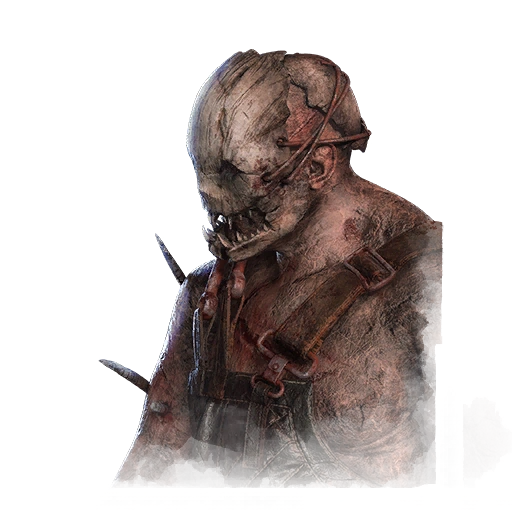
i am excruciatingly neutral on this guy. he is kind of John Killer, which makes sense for how much I dgaf, but still. his mask is cool as fuck, but his lore really doesn’t resonate with me. trapping is a fun gimmick but apparently he lends himself to a lot of campy playstyles, which doesn’t sound too fun. he just exists to me.
philip ojomo - the wraith
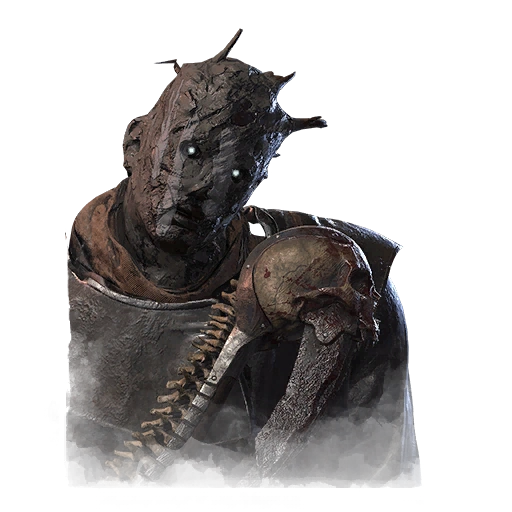
this guy’s just really downright miserable. he doesn’t even wanna be here. he just wants to work at a Denny’s and live alone with a cat or whatever. invisibility is neat and the big stupid bell ring for whenever he does it is really funny though. cool guy I just feel bad for his existence
max thompson jr - the hillbilly
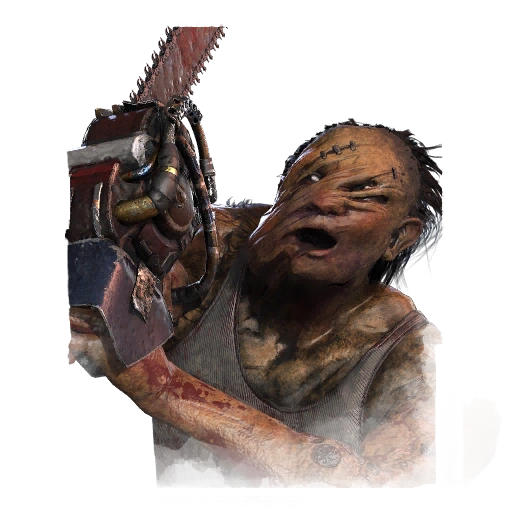
iunno this guys concept and lore just rub me the wrong way. just feels tone-deaf. much like wraith i think we should just leave this guy alone and let him farm in peace. he’s had a rough go of it. letting him be just some normal guy would make everything feel less. ew.
sally smithson - the nurse
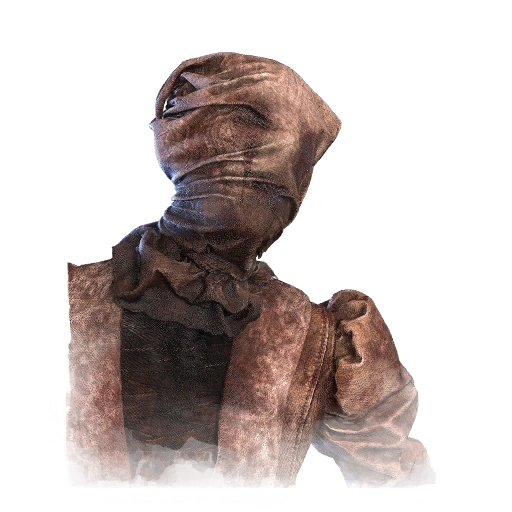
how does she see out of that thing.
jokes aside she’s another i don’t feel strongly about. apparently she’s pretty meta due to her teleportation shenanigans, but otherwise she doesn’t catch my eye. I’m sorry women
lisa sherwood - the hag
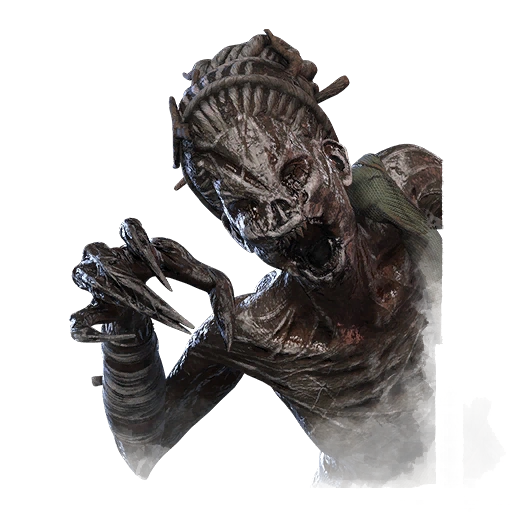
really strong design-wise. really neat looking fungus plant lady. another one that really doesn’t wanna be here. like holy hell ma’am. maybe she and billy can go grill things together away from killing people for a big spider demon. otherwise I’m neutral on her too.
herman carter - the doctor
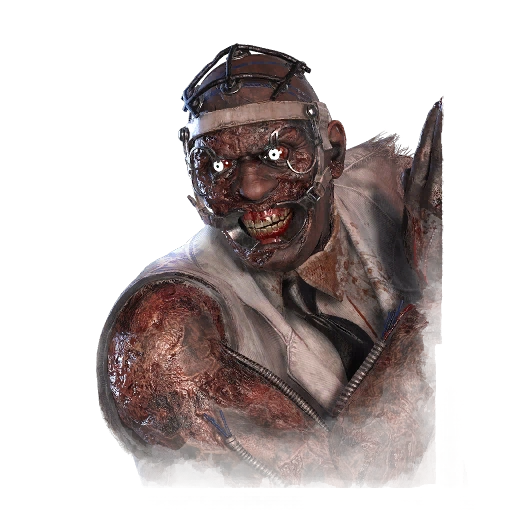
oh YEAH baby. this guy’s my MAN. he’s a complete SHITHEAD and is TERRIBLE and he’s very fun to watch. Electroshock Andy over here is the giggliest guy on campus and has some really funny builds and gimmicks and is also unreasonably complicated. jumpscare doctor is so fucking funny plus electricity themes are cool even if it is the endlessly fucked up existence of electroshock therapy and military-funded abuse, but what is horror without being a little slice of messed up reality? I never want to go near this man in my life.
anna - the huntress
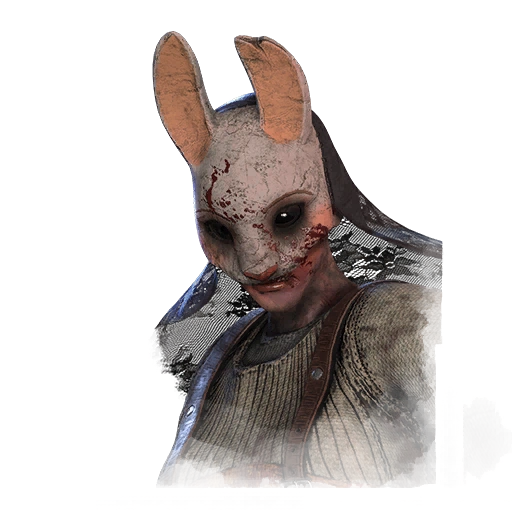
I like her!! she’s pretty and fucked up. i like predator/prey motifs and she’s got a nice voice. my fav thing about her is the existence of orbital huntress. hilarious as hell. you can just cross-map bean someone with a hatchet to their skull. fuck yeah.
jeffrey hawk - the clown
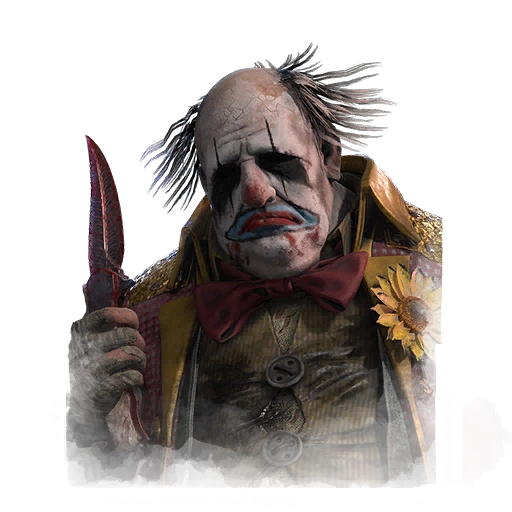
he’s not even the cunty jester or joyous giggler kind of clown. he’s a freako with a thing for fingers that drugs people. i don’t want to be anywhere near this man in my life. fun short film though. damn good horror villian I just. ewwwwwwwwww
rin yamaoka - the spirit
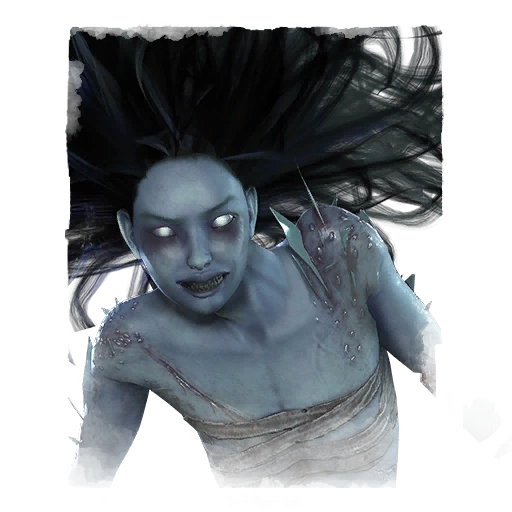
she should be allowed to kill people actually. literally just some kid as far as I know. i’d be pissed off too if my dad got so fucked over by a company that he started killing people. living in the scary dimension and stabbing people sounds like a way better time than that. saw someone cosplay her once at a convention too and that was pretty neat.
the legion
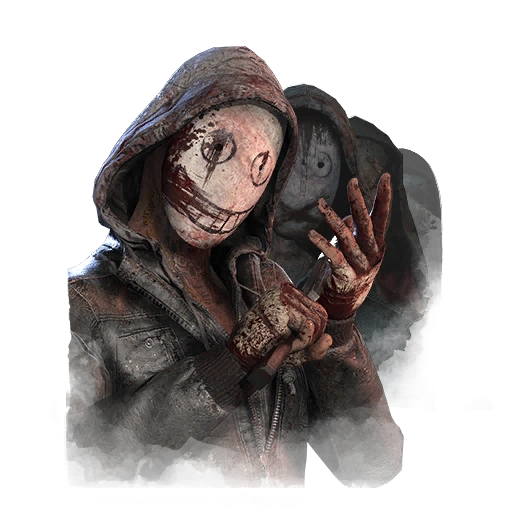
genuinely wonderfully funny concept. these lot are just some kids that kill people as a hobby. they have a logo and listen to mixtapes while doing it and all. they’re spy mains that think they’re hot shit. the title is unreasonably cool for what they are. the fact they just have to like lie down and take a moment to go wheeze after using their ability is great too. they forgot to pack an inhaler or four to the scary dimension
adiris - the plague
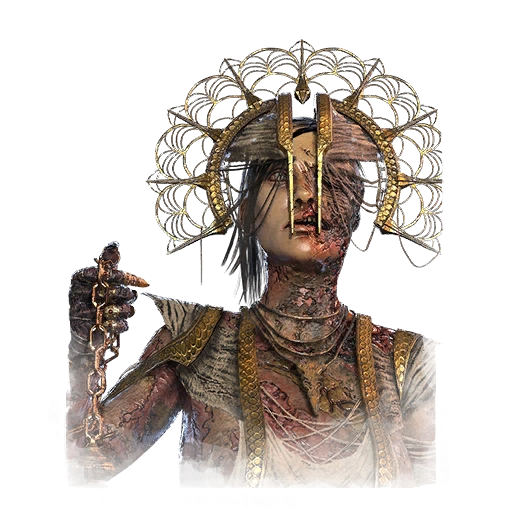
frankly unreasonably badass design. ancient mesopotamian preiest that just like.vomits on people. i'm not too invested in whatever she's up to religion-wise i just think the fact she horfs up blood as a projectile weapon is sick as fuck. the censer as a melee is cool too
kazan yamaoka - the oni
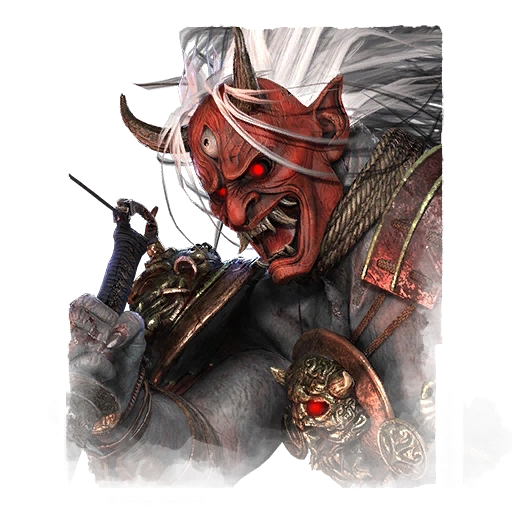
this is the spirits great great peepaw or something aparently. i do love the aestehtic of traditional japanese masks i just wish the mask here had the big ol' eyes and bigger teeth. he hits people with a big club too i guess. neutral on this bloke.
caleb quinn - the deathslinger
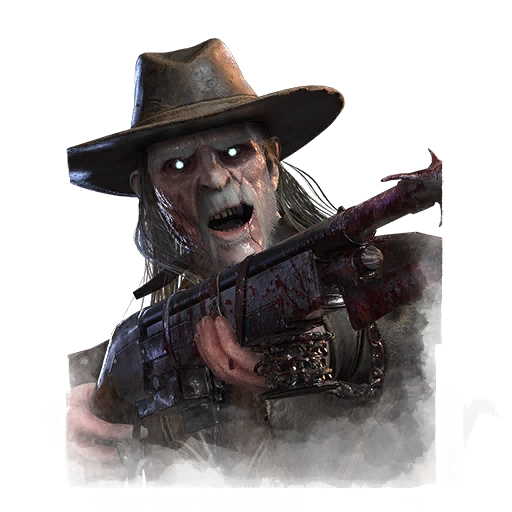
IRELAND MENTION LETS FUCKING GOOOOOOOOOOOOOOOOO
otherwise this is a sick guy. old freak who got fucked over by capitalism so hard he decided to build a gu and shoot people with a harpoon about it. plus he's a cowboy. consideirng my biggest interest right now is great god grove, i am predisposed to liking cowboy motifs. also he's really funny in the 2v8 gameplay ive seen you literally just go fishing
talbot grimes - the blight
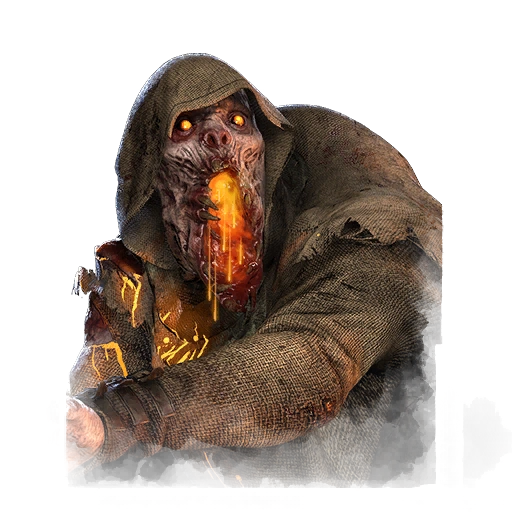
his main gameplay loop involves ramming into walls like an idiot before hitting someone with a big stick. i guess thats what the infection from hollow knight does to a guy. my only other strong opinion is that they shuould make his rushing running scream be the scotland forever voice clip
charlotte n' victor deshayes - the twins
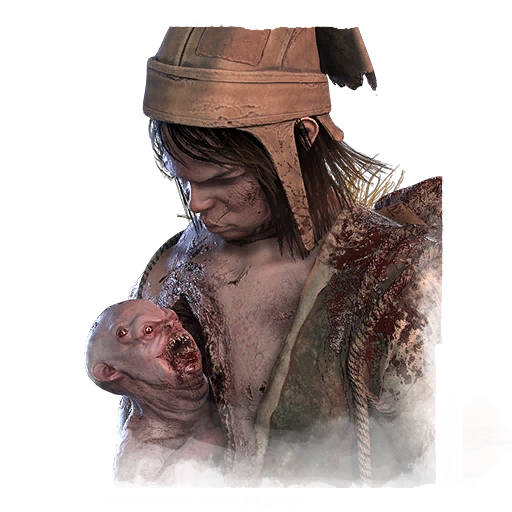
can this game be normal about facial differences for two fucking seconds . anyway te concept is neat i guess and i like how kicking the infant is so tempting within this game that theres apparently entire meme playstyles based aroud baiting people into kicking the baby, thus getting them out of position for you to go hit them with your scythe
ji-woon hak - the trickster
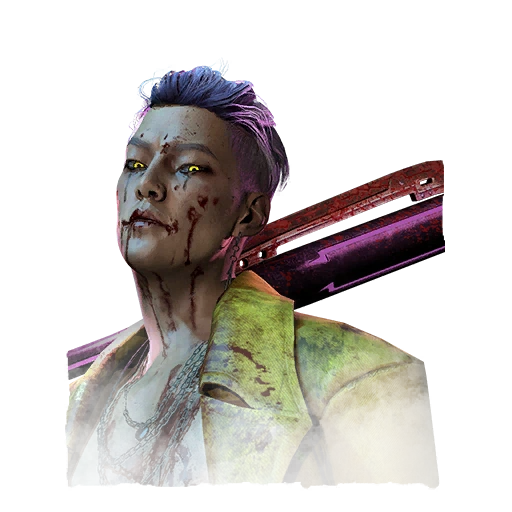
shame that yet another title that couldve been used for a cunty jester has been taken. oh well. at least we have this guy who's pretty neat. a whole thing based on the k-pop industry is a rlly oddball choice for a horror game, but i dunno i've heard that said industry can get pretty fucked and exploitative. also i like neon colours a lot. the whole bit with him making his synths out of samples of his victims which he goes on to put into his work is really neat i think. hes kinda just some guy though
carmina mora - the artist
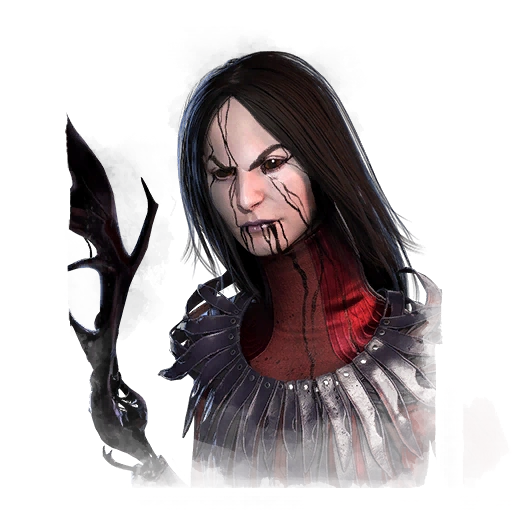
alright. her design is really neat and i like all the ink and strong red and black colours and her weird claw hand she turns her hand into. but she is possibly the funniest design slip-up ever. she's chilean and from chile and her major thematic throughline is crows. apparently, chile is like, one of the only countries to not have crows in it. lmao
the dredge
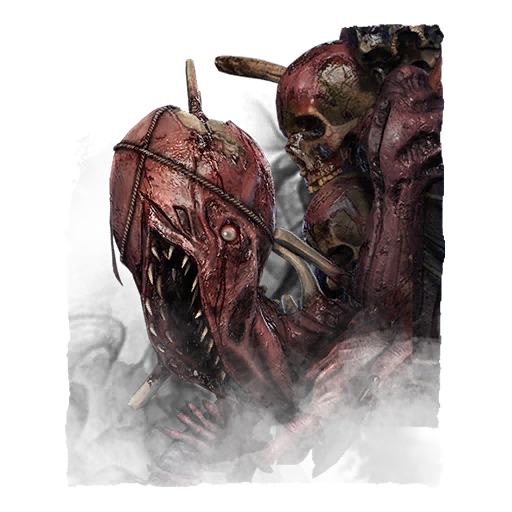
dredge!! dredge my friend dredge!! one of the three Creatures Buddies, dedge is like so fucking cute to me. thats a puppies dog. sure this puppies dog was formed from a dark fucked up ritual spawned from a jonestown situation and is the amalgam of hundreds of people stuck in a high-control cult enviornment, but consider that they're a puppies dog. i think if igave them a sugar cube things would be ok
tarhos korvács & the wacky bunch - the knight
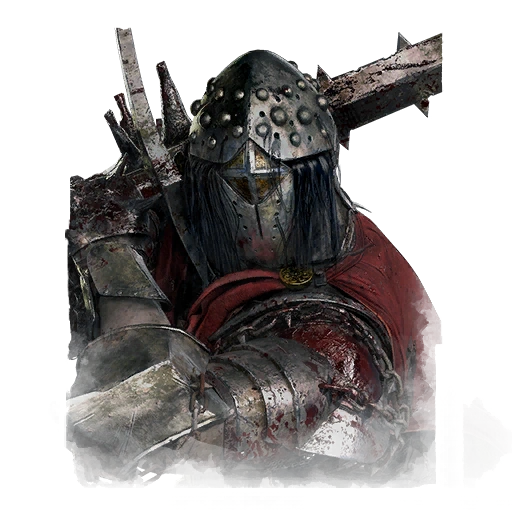
i mean, cool ass concept of a murderous knight and his buddies all being played at once. i'm otherwise neutral. not really a medeival fan, but they're cool i suppose.
adriana imai - the skull merchant
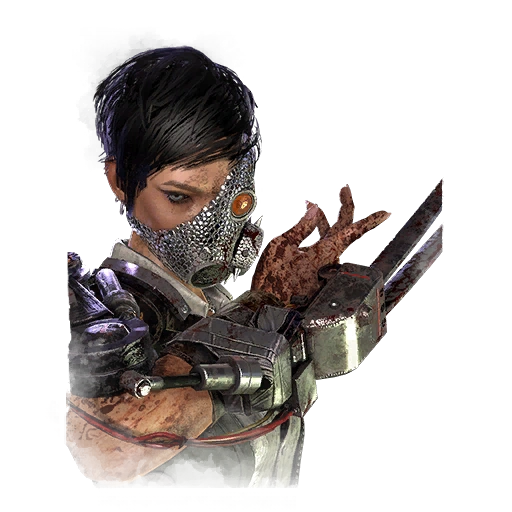
alright she was definitley spawned from the result of a gaggle of designers throwing concepts at the wall and trying to shove them into a pile. a cut-throat millionare who kills ceos for fun, a comic book hero brought to life into a villian by the author's daughter, and a sci-fi high-tech conniving surveillance master murderer. i can respect that mish-mash design philosophy a lot but i'm otherwise also neutral. her little claw arm contraption thing is fun though
hux-a7-13 - the singularity
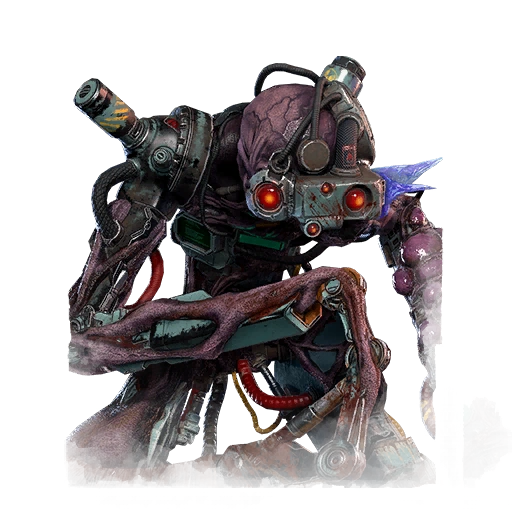
i really, really like hux! i'm a sucker for evil AI, especally one that's also getting into bioengineering and meaty mechanics. for a heartless killer who's hellbent on the kinda cliche goal of becoming the ultamite lifeform by assimilating others genetic info, he's actually kind of a smug snarky cunt. he calls people worms for no reason. he literally calls people annoying for screaming in pain. i think he and p03 would get along disastrously.
the unknown
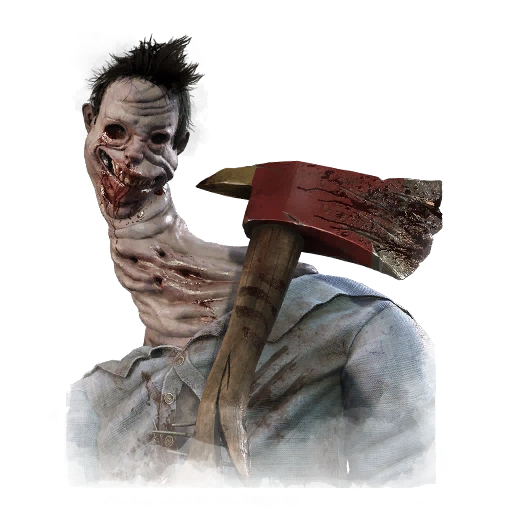
one banger to the next. unknown here is a wriggly strange mass that's a love letter to creepypasta, urban legends, found footage and perhaps even the more recent development of analog horror. a squirmy fella who steals voices and fucks over anyone who comprehends them. doesn't even wanna be in the scary spider dimension if i recall correctly. i love the disjointed voicelines that come across as them mimicking whatever they've heard, but they're definitley like.. sapient. i think they have a dashing smile and a lovely crawl.
portia maye - the houndmaster

um. hi. hii hello ma'am. hellou. hi.
this is the newest addition, and she's a doozy. scotish pirate lady with a big ol' dog she loves very much. i don't know much about her.. but apparently her dog's breed is like, a notably loyal and strong one used as a guard dog/ and the lady herself? oh my god she's so fucking pretty. the gold and red on the coat. her badass knife cane. im quaking in my boots for a variety of reasons. i don't find her scary, don't find any of this lot traditionally scary, but yknow. she/s still sick as hell.
#horror cw#body horror cw#dead by daylight#i aint even a fan of this. i just have opinions and lots of them#maybe ill make more reviews of things and post them for fun#become the bogleech wannabe i am destined to be
13 notes
·
View notes